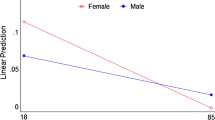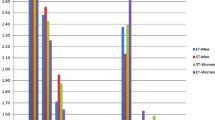Abstract
The sex-typing of 581 Fiji secondary school and 240 university students was measured using the Personal Attributes Questionnaire (PAQ). Same-sex-typing is less marked in Fiji than in the United States, and there are no differences between the sexes in sex-typing patterns. Minor ethnic group variations among Fiji students occur. University students, especially females, are more similar to their United States counterparts than are secondary school students. The pattern of intercorrelations of PAQ scales suggests a different definition of sex roles in the two countries. The use of the PAQ to tap meaningful cultural differences is discussed.
Similar content being viewed by others
References
Barry, H., III, Bacon, M. K., & Child, I. L. A cross-cultural survey of some sex differences in socialization. Journal of Abnormal and Social Psychology, 1957, 55, 327–332.
Basow, S. A. Sex-role stereotypes: Traditions and alternatives. Monterey, Calif.: Brooks/Cole, 1980.
Bem, S. L. The measurement of psychological androgyny. Journal of Consulting and Clinical Psychology, 1974, 42, 155–162.
Ritchie, J., & Ritchie, J. Growing up in Polynesia. Sydney: George Allen & Unwin, 1979.
Runge, T. E., Frey, D., Gollwitzer, P. M., Helmreich, R. L., & Spence, J. T. Masculine (instrumental) and feminine (expressive) traits. Journal of Cross-Cultural Psychology, 1981, 12, 141–162.
Spence, J. T., & Helmreich, R. L. Masculinity and femininity. Austin: University of Texas Press, 1978.
Spence, J. T., Helmreich, R. L., & Stapp, J. The Personal Attributes Questionnaire: A measure of sex-role stereotypes and masculinity-femininity. JSAS Catalog of Selected Documents in Psychology, 1974, 4, 127.
Thomas, D. R. Authoritarianism, child-rearing practices and ethnocentrism in 7 Pacific Islands groups. International Journal of Psychology, 1975, 10, 235–246.
Whiting, B. B., & Edwards, C. P. A cross-cultural analysis of sex differences in the behavior of children aged 3–11. Journal of Social Psychology, 1973, 91, 171–188.
Author information
Authors and Affiliations
Additional information
Portions of this research were funded by Grant No. P-798-R-7 from Lafayette College's Committee on Advanced Study and Research. The author's appreciation goes to members of the School of Education at the University of the South Pacific for their helpfulness during the course of this research, as well as to the Ministry of Education and to the principal of the five secondary schools studied.
Rights and permissions
About this article
Cite this article
Basow, S.A. Cultural variations in sex-typing. Sex Roles 10, 577–585 (1984). https://doi.org/10.1007/BF00287266
Issue Date:
DOI: https://doi.org/10.1007/BF00287266




